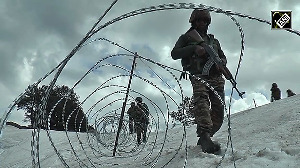 In a note to his students titled ‘In a Background of Elections – The Development Debate’, Dr Frazer Mascarenhas, principal of Mumbai’s St Xavier’s College, one of the city's premier educational institutions, slams Narendra Modi’s Gujarat and is in all praise for the United Progressive Alliance’s Rozgar Yojana and the Food Security Act. We reproduce the piece with kind permission from Dr Mascarenhas.
In a note to his students titled ‘In a Background of Elections – The Development Debate’, Dr Frazer Mascarenhas, principal of Mumbai’s St Xavier’s College, one of the city's premier educational institutions, slams Narendra Modi’s Gujarat and is in all praise for the United Progressive Alliance’s Rozgar Yojana and the Food Security Act. We reproduce the piece with kind permission from Dr Mascarenhas.
The approaching elections have brought an interesting discussion to the public forum on what constitutes human development and how it is to be achieved. The Gujarat model has been highlighted for our consideration. That is very apt because it puts in stark contrast two current views. Is the growth of big business, the making of huge profits, the achievement of high production -- what we seek? Or is it the quality of life for the majority in terms of affordable basic goods and services and the freedom to take forward the cultural aspirations of our plural social groups that make up India?
Gujarat may be doing well in the first sense, although not as good as some other states in the country. But all the Human Development Index indicators and the cultural polarisation of the population show that Gujarat has had a terrible experience in the last 10 years.
Take the example of education: schools for the ordinary populace show abject neglect with a very high dropout rate in the last 10 years. Higher Education has not been allowed to move forward. To take just an example, St. Xavier’s College Ahmedabad, thrice NAAC (National Assessment and Accreditation Council) accredited with an equivalent of the A grade, has not been able to gain permission from the Gujarat government for Academic Autonomy, for the last 10 years and has finally won a battle in the high court to approach the UGC directly for this status.
Gujarat has also been the worst performer in settling claims and distributing title deeds to tribal people and other forest dwellers, as shown by the latest data put out by the Union Tribal Affairs Ministry. Till 2013, the state, with 15 per cent tribal population, settled only 32 per cent of the claims, the lowest rate in the country.
As opposed to this, efforts like the Rojgar Yojana and the Food Security Act have been called “election sops”. However some of our best social scientists like Amartya Sen and Jean Dreze have supported these as necessary in the emergency economic situation the country and the world is facing. The country is grateful that committed activists like Aruna Roy and Shailesh Gandhi have worked with the government to initiate and sustain the Right to Information Act, which makes accountability possible. Corruption still needs to be addressed effectively but since it is so prevalent at every level of society, it will take the civil society long agonising efforts to root it out.
A massive investment in health and education is sorely needed in our country of widening disparities and those who support big business and its unethical profits will never agree to such public expenditure for the masses. In fact, the worsening situation of environmental degradation and depletion, in the lunge for growth and profit, shows up the real intentions of the greedy. None can withstand this, as seen by the many clearances given in a week’s time after the recent change of guard at the central environment Ministry, which had earlier tried to hold the line under a different minister.
So what lessons does a reflection on the approaching elections teach us? The prospect of an alliance of corporate capital and communal forces coming to power constitutes a real threat to the future of our secular democracy. Support for people who pledge to work to take Human Development Indicators higher and who commit themselves to a pluralistic culture in diverse India -- this is the hope for the future. No magic wand or divine miracles will come to the aid of the Indian people. Their reasoned choice of individuals and political parties who promise to work for a real quality of life for all, will see India prosper or flounder on the precipice. Choose well!
Dr Frazer Mascarenhas S J
Principal
St Xavier’s College, Mumbai











 © 2025
© 2025